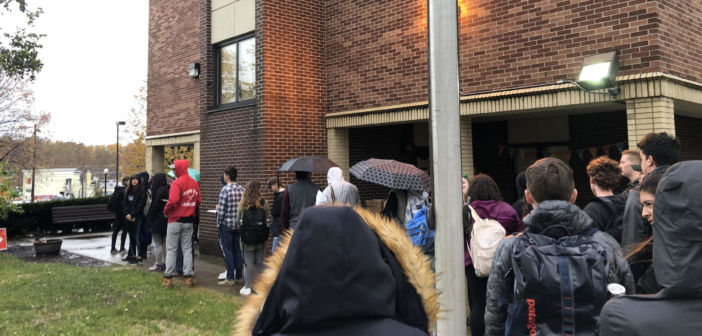For some Lehigh students looking to vote in the midterm elections, several for the first time, the experience ended in tears and frustration — and not due to the election’s results.
NextGen America, an organization “dedicated to registering and turning out young voters at an unprecedented rate in eleven states,” has been active at Lehigh in recent months. It has tabled on campus, encouraging students to either register to vote through the organization for the first time or to switch their registrations from their home addresses in order to cast ballots in Bethlehem.
But some students who registered through NextGen America were never officially registered in Northampton County and therefore, were ineligible to vote.
Michelle Rodriguez, ‘21, is one of these students.
Rodriguez said she registered with the organization on campus in late September. When she was confused about her registration status and her voting location, she contacted Northampton County. A representative from the county told her that her records could not be found, and after a back-and-forth with NextGen, who Rodriguez said stopped responding to her emails, no record of her voter registration form was ever located at the Northampton offices.
“I cried three times in two days,” Rodriguez said. “All I wanted to do was vote. I would get mad at other people for not voting, and now I can’t.”
Rodriguez said she still went to the polls to fill out a provisional ballot. While there, she said a poll worker who couldn’t find her name asked if she registered with NextGen. The poll worker said he was aware of an issue with students registering through the organization and not being able to vote on Election Day.
Rodriguez will not know if her provisional ballot was counted for another five to seven days.
Liam Magargal, ‘22, experienced a similar problem.
Magargal said he and his friends were in Farrington Square one day in September when he decided to switch his voter registration from his home state of Delaware to Pennsylvania through a NextGen representative.
By Election Day, only two of his four friends who filled out their registration information through NextGen were able to vote. Magargal was not one of them.
Magargal said he checked his registration status online two weeks ago and his name never showed up. That’s when Magargal realized he never received his voter registration card.
“I’m frustrated,” Magargal said. “I’ve been following politics since age 15 — I do keep up with events, and I’m annoyed that in my first election, I was not allowed to vote because people wouldn’t send my form.”
Magargal said he contacted the Pennsylvania Department of State, but was told there was nothing that could be done. The agency instructed Magargal not to register with NextGen in the future, and instead, follow the typical registration process through the state.
“These people are up in my face about registering but for two months they didn’t actually register me,” Magargal said. “They’re all about the youth vote but for some reason excluded me.”
Zoe Kravitz, ‘20, has encountered problems with NextGen for two elections.
In 2016, Kravitz registered with NextGen as a first-year student after a 5×10 event. After waiting in line for three hours, Kravitz, was not allowed to vote. Kravitz said two people in front of her were also unable to vote. They had all registered through NextGen.
Kravitz said she contacted NextGen and received no response.
Now in 2018, Kravitz said she again wanted to switch her registration from Vermont to Pennsylvania. When NextGen approached her about registering this year, Kravitz admitted she was skeptical but was promised the same mistake wouldn’t happen again.
The day before the election, Kravitz checked her status online. She wasn’t registered to vote.
After contacting Northampton County and the Pennsylvania Department of State, her records were nowhere to be found. She said she messaged about the incident on social media and found out that others were in a similar situation.
Kravitz said the Department of State told her if more students file reports, it will look into NextGen.
“I’m livid about (not being able to vote in 2016),” Kravitz said. “I left (the polls) in tears and was so angry. I was on the phone with my dad and crying, especially as I was watching the presidential results come in in Pennsylvania.”
Potential first-time voter Sharon Getsis, ‘21, said NextGen also failed to properly register her.
After a friend warned her of NextGen’s issues, Getsis got on it right away.
“It’s really important for young people to have a voice,” Getsis said. “When I heard others had issues, I got really worried and checked.”
When Getsis checked her name, nothing appeared.
Victoria Vinall, an employee at NextGen, said in an email that the organization has a full audit system to ensure every form is turned in. Once the voter registration office receives the form, Vinall said, it’s in the office’s hands.
Specifically, Vinall said, “if a student has put incorrect information on their form, (NextGen doesn’t) know how the registrar responds to that or attempts to fix it.”
Will Constant, ‘21, a native of New Jersey, went to the Litzenberger House on election night to cast his ballot in Pennsylvania. Constant said he attempted to register with NextGen, but when he checked online, his registration status was not complete.
So, he asked the poll worker for a provisional sheet to be able to vote in Pennsylvania.
The poll worker questioned Constant’s age and asked to see his ID. When Constant provided the man his New Jersey driver’s license, the man refused to let him vote.
The man asked Constant, who is African-American, how he knows that he didn’t vote twice — once already in New Jersey.
Constant said he was the only one in line who had to show his ID and prove his age, even with his friend being from California. He said it seemed like the man was trying his hardest to make sure he couldn’t vote.
Constant said he was the only one the man was giving a hard time, and everyone before and after him had no problem receiving a provisional sheet.
“Despite all his efforts, I was not going to give up my opportunity to vote,” Constant said. “Why me? Why of all people in the line — nobody in line had any problem getting a provisional sheet until I voted.”
Constant said he refused to leave until he was given a sheet. After 90 minutes at the polls, he finally was given a ballot.
“I shouldn’t have to still fight to vote, it shouldn’t be something I have to fight so hard for and I feel like that’s why a lot of kids don’t vote,” Constant said. “On the basis of race, there was no reason I shouldn’t have been able to vote, that’s not fair. I shouldn’t have to fight to vote in 2018 — what do I still have to fight for? That makes no sense.”
Students have also received text messages from NextGen advocating for specific candidates.
Vinall described NextGen’s partisan stance as “a progressive organization” but that its voter registration as “completely nonpartisan.”
Some students are confused, though. One text sent from NextGen to students registered with the organization on Nov. 4 read: “There’s an important election on Tuesday 11/6 and we’re counting on you to vote for Gov. Wolf!”
NextGen’s website also states, “young voters will help progressives flip Congress, win Governor’s races, and take back state legislatures. We are the key to achieving progressive victories in 2018.”
Rodriguez felt that the organization betrayed her trust.
“It makes it seem even like there’s something deeply wrong with this organization,” she said. “They’re trying to promote political participation — but only if you vote a certain way. Don’t pretend to be neutral when you’re not.”






Comment policy
Comments posted to The Brown and White website are reviewed by a moderator before being approved. Incendiary speech or harassing language, including comments targeted at individuals, may be deemed unacceptable and not published. Spam and other soliciting will also be declined.
The Brown and White also reserves the right to not publish entirely anonymous comments.
5 Comments
Sounds like a scam to me. Locally there was an organization that apparently was paid by the head for each new voter that was signed up, apparently many of the forms were not turned in. I have not seen numbers on how many of those were not able to vote but the total number in Georgia was significant.
Was this a problem with all of NextGen voters or only certain ones? That would narrow down the problem.
It’s a fly-by-night. They’re sloppy, not organizedly fraudulent. They pay people bits of money to go around doing this, naturally they’re not all going to be committted to taking care of the registrations, it’s not the League of Women Voters. If 95% of those collected registrations actually made it all the way through, I’d be surprised and impressed. They were aiming for 100K registrations nationwide, so at 95% they’d have lost or thrown away 5000 people’s registrations.
This is a hard lesson, but I don’t think the students who had trouble voting would’ve entrusted their college applications to some rando with a table and a clipboard. When paperwork’s important, take care of it, make sure it’s going where it needs to go by some trustworthy courier or deliver it yourself, and get receipts.
When I first voted in 1972, it was an absentee ballot to my home on Long Island that was mailed to me at school. Something always available and proper anyway for students whose legal address is at their home.
Nice article addressing this problem it is rarely talked about on other websites. The best that can be done is putting as much info up about finding stamps to educate the younger ones.